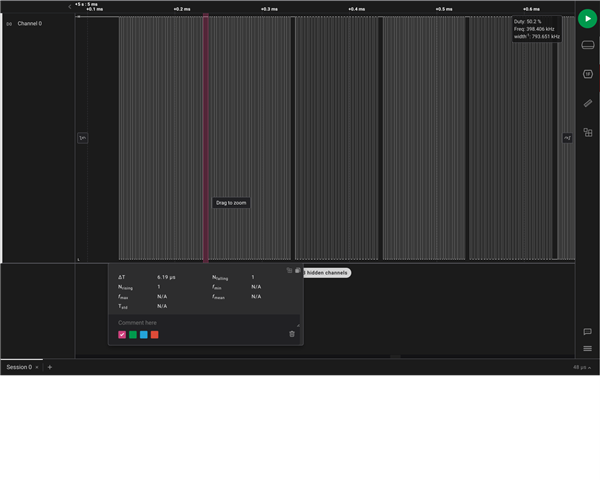Hello,
I am trying to run two timers: TimerA and TimerB for pwm generation simultaneously.
Timer A : clock source is TACLK using external crystal of 16MHz (provided from pin 3.4 of another msp430fr5969 having populated Y1 with 16 MHz crystal)
Timer B: clock source is SMCLK which is mapped to MCLK at 16 MHZ (DCO source)
My final aim is to generate 2FSK signal at high baudrates for that I am using timer A as my baudrate source and Timer B to generate 2 frequencies of FSK
Relevant code snippets:
void set_cpu_freq() {
FRCTL0 = FRCTLPW | NWAITS_1;
CSCTL0_H = CSKEY >> 8; // Unlock CS registers
CSCTL1 = DCORSEL | DCOFSEL_4; // Set DCO to 8MHz
CSCTL2 = SELA__VLOCLK | SELS__DCOCLK | SELM__DCOCLK;
CSCTL3 = DIVA__1 | DIVS__1 | DIVM__1; // Set all dividers to 1
}
int main(void) {
WDTCTL = WDTPW | WDTHOLD; // Stop watchdog timer
P1OUT &= ~BIT3; // Clear P1.0 output latch for a defined power-on state
P1DIR |= BIT3; // Set P1.0 to output direction
P1DIR &= ~BIT2;
PM5CTL0 &= ~LOCKLPM5; // Disable the GPIO power-on default high-impedance mode
// to activate previously configured port settings
set_cpu_freq();
while (1) {
//message generation code: generates an array with binary information
__enable_interrupt();
TA0CTL = TASSEL__TACLK | MC_1 | TACLR; // SMCLK, Up mode, no divider
TA0CCR0 = (16000000/10000) - 1; // Set period based on SMCLK frequency
TA0CCTL0 = CCIE; // Enable interrupts
TA0CCTL1 = OUTMOD_7;
TB0CTL = TBSSEL__SMCLK | TBCLR | MC_1 ; // SMCLK, up mode, /8 divider
TB0CCTL1 = OUTMOD_7;
TB0CCTL0 = CCIE; // Enable CCR0 interrupt
delay_ms(100);
}
}
#pragma vector=TIMER0_B0_VECTOR
__interrupt void Timer0_B0 (void)
{
P1OUT ^= BIT3; // Generates the FSK frequency
}
__attribute__((interrupt(TIMER0_A0_VECTOR))) //controls the baud rate of the FSK signal
void timer_a0_isr(void) {
if (tx_counter < TXLEN){
if (arr[tx_counter] == 0){
TB0CCR0 = (CPU_FREQ/(2*300000)) -1;
}
else if(arr[tx_counter] == 1){
TB0CCR0 = (CPU_FREQ/(2*400000)) -1;
}
tx_counter++;
}
else{
tx_counter = 0;
disable_signal();
msp430_timer_stop();
}
}
Problem:
As depicted in the below image, I observed delays of about 6-7 microseconds between frequency switches, initially I was using SMCLK for both of the Timers A and B, observing the same issue, I assumed this must be an issue originating from the fact that both the timers using same source i.e SMCLK, I switched to the current setup of using TACLK for Timer A annd SMCLK for Timer B but the same issue persists, resulting in limitations of baudrate as the 6-7 microsecond gap becomes much more significant as I increase the baudrate eg 30kbps. My aim is to have atleast 100Kbps of baudrate.

Anticipating some suggestions from the community to mitigate this issue.
Regards!

